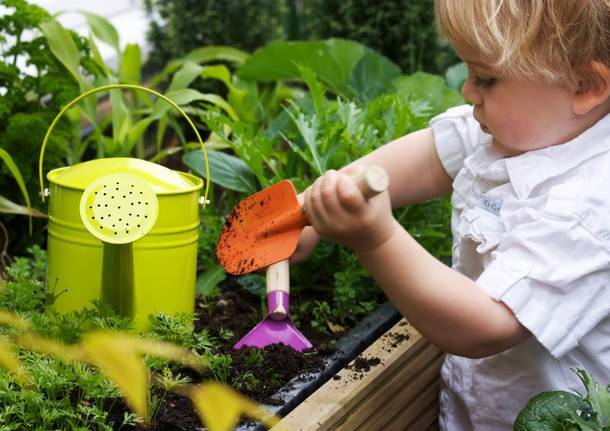Experiencing a garden with your children
All you need is a balcony, some soil and water, and a few seeds or seedlings: it is all child-sized, for it to look after and to learn to be patient, to wait and to care

Spring is the right time to teach children about the garden. You don’t need acres of land, and to be honest, you don’t even need a garden: all it takes is a balcony or a shelf by the window, with a few pots and a handful of seeds or seedlings for you and your children to experience the incredible thrill of watching a plant grow and of tasting the fruits, the results of patient and constant care that you provide together.
ALL CHILD-SIZED
Wherever you set up your little garden, the important thing is that it is child-sized.
The pots must be child-high, and the tools, from a small watering can to the spade for making holes in the ground, must be the right size for its little hands.
Something else that will make the experience successful is providing clothes that can get dirty or an apron to wear when working the ground. And providing a permanent, convenient place in which to store all of the tools when the work is done, even independently.
WHAT TO PLANT
The plants suitable for a child-sized garden are those that grow easily, that ripen quickly. So, the most common aromatic plants with their characteristic smells, which are easy to recognise and to use in everyday cooking, such as rosemary, sage, thyme, basil, parsley and chives, are good.
But fruit and vegetables also give a great deal of satisfaction, first of all strawberries, but also cherry tomatoes, cucumbers, courgettes, lettuces and carrots.
What is important is to choose according to the availability of space and time, because there is no point in planting tomatoes if, in August, you go away on holiday, and there is no one to water and pick them.
WHEN TO PLANT
The month of April is ideal for sowing basil, celery and tomatoes and, until the beginning of the summer, beetroot, carrots, cucumbers, beans, green beans, lettuces, courgettes, chives and parsley can be planted.
THE FRUITS
In addition to enjoying the harvest, the child develops a sense of responsibility and respect for nature, as it takes care of the garden. It increases its skills and strengthens its self-esteem, learning the importance of care, patience and waiting.
TAG ARTICOLO
La community di VareseNews
Loro ne fanno già parte
Ultimi commenti
Lina Hepper su La Provincia di Varese studia un gestore unico dei rifiuti: "Una strategia a lungo termine per anticipare il futuro"
Cloe su Quattro eccellenze varesine premiate dai Travelers' Choice 2025 di TripAdvisor
lenny54 su Turisti ebrei con la kippah aggrediti in autogrill a Lainate
Felice su A Gallarate è stata aperta la maxi-rotonda lungo viale Milano
Felice su Turisti ebrei con la kippah aggrediti in autogrill a Lainate
Felice su Botte in strada e casino, la moda del “carico di compleanno” arriva a Varese
















Accedi o registrati per commentare questo articolo.
L'email è richiesta ma non verrà mostrata ai visitatori. Il contenuto di questo commento esprime il pensiero dell'autore e non rappresenta la linea editoriale di VareseNews.it, che rimane autonoma e indipendente. I messaggi inclusi nei commenti non sono testi giornalistici, ma post inviati dai singoli lettori che possono essere automaticamente pubblicati senza filtro preventivo. I commenti che includano uno o più link a siti esterni verranno rimossi in automatico dal sistema.